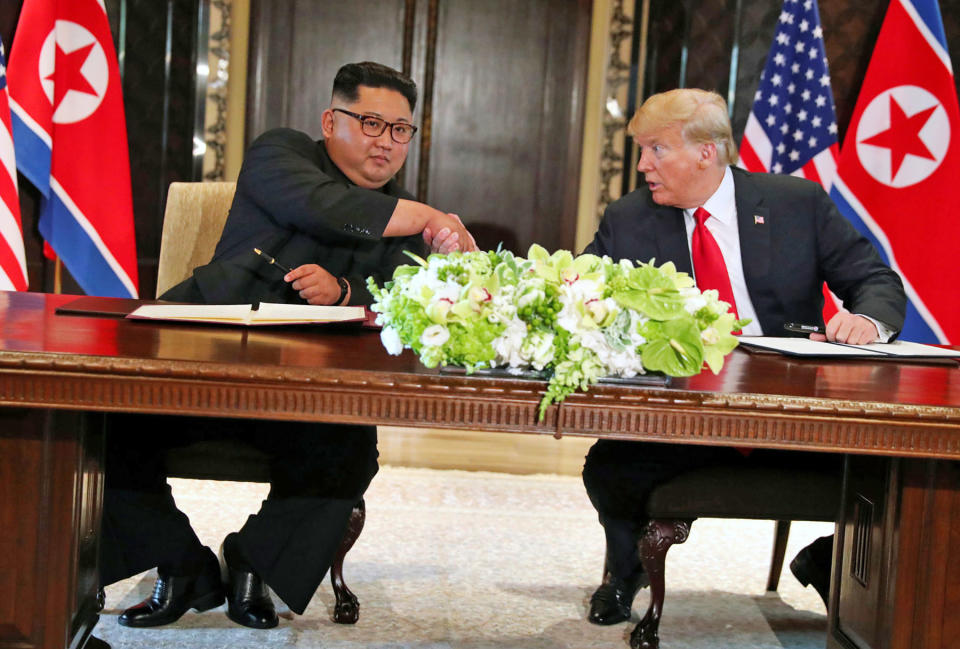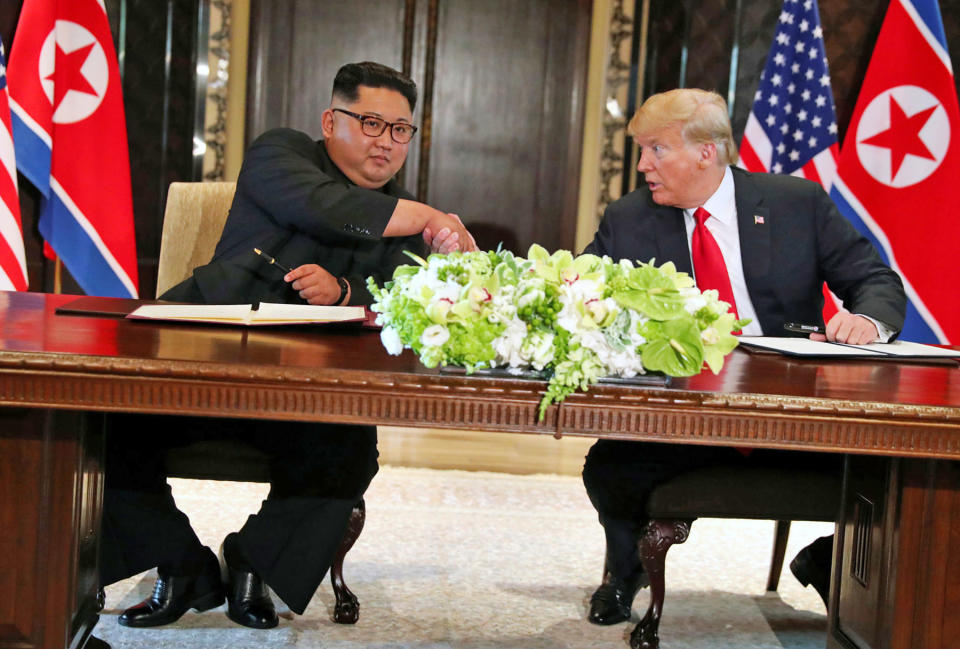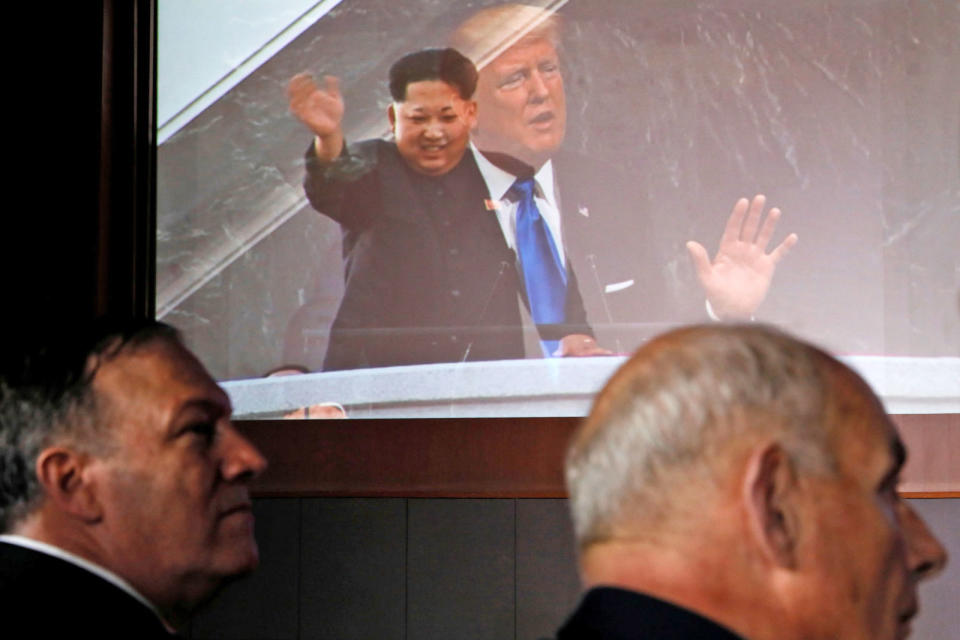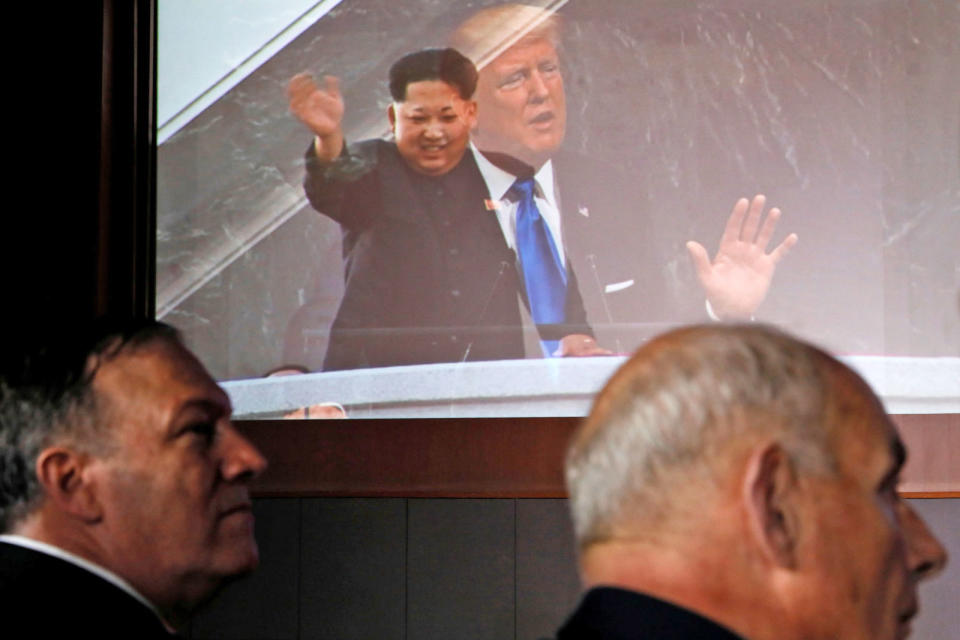The scary truths about Trump’s nuclear summit
In which Donald Trump and Kim Jong-un compared the size of their nuclear buttons.
In the first summit meeting between the leaders of the United States and North Korea, Donald Trump met with Kim Jong-un on June 12, 2018, in Singapore. The two leaders smiled warmly, posed for cameras as friends, shook hands, and Trump spoke in glowing terms of admiration about Kim at the news conference.
The summit came after a year-and-a-half of both men terrorizing the world with open threats of thermonuclear annihilation and childish public insults. Trump derisively nicknamed the North Korean dictator "Rocket Man" and called him "fat and short," while Kim called Trump "a mentally deranged U.S. dotard." This week's historic meeting was nearly scrapped by Trump in a threatening yet passive-aggressive letter to Kim that tried to make the cancellation look like it was North Korea's idea.
On behalf of the United States, Trump conceded to Kim the discontinuation of joint military exercises with South Korea and to withdraw troops stationed there; he also gave Kim international standing and lavished him with compliments. He echoed North Korean rhetoric, which characterizes the military exercises as "very provocative."
In response to accusations about giving away the farm for a handful of rocks and rusty Nuka Cola bottle caps, USA Today reported that other than agreeing to a meeting, Trump said: "I gave up nothing."
In return, we got a crazy-vague joint statement wrapped in a PR stunt. All North Korea gave us was a meeting. The signed agreement had no specifics about denuclearization. The 1.5-page document ignored North Korea's existing stockpile of nuclear weapons, had no verification provisions whatsoever, and failed to address ongoing issues of its attacks, kidnappings, and physical threats on Japan and South Korea.
North Korea has historically avoided true nuclear disarmament, preferring to qualify any agreements instead as denuclearization of the peninsula. "That has always been interpreted as a call for the United States to remove its 'nuclear umbrella' protecting South Korea and Japan," wrote Reuters. The country has promised denuclearization since the 1990s and has repeatedly ignored that promise as a rule.
Emerging from the summit as a victorious bringer of peace on Earth, Trump tweeted that "everybody can now feel much safer than the day I took office. There is no longer a Nuclear Threat from North Korea."
I'm not sure it's possible to capture an entire era in one image, but Dennis Rodman running a cryptocurrency grift on live TV from the North Korea summit while wearing a MAGA is a serious nominee https://t.co/Qs7aQ4w6n8
— Benjy Sarlin (@BenjySarlin) June 12, 2018
It was a stunning concession when Trump announced, "We will stop the war games which will save us a tremendous amount of money." It shocked and baffled South Korea and other allies, the Pentagon, US military officials and members of the Republican Party. This came hot on the heels of Trump saying it would be better if South Korea and Japan protect themselves.
South Korea and Japan are not feeling the same love in the air as Trump and Kim. "His announcement was a surprise even to President Moon Jae-in's government in Seoul," wrote Reuters. "One South Korean official said he initially thought Trump had misspoken." South Korea's largest newspaper, Chosun Ilbo, openly worried that the North will keep its nuclear weapons program permanently as a result of Trump's concessions, describing the summit as "dumbfounding and nonsensical."
You see, we've allied ourselves to help protect South Korea for some pretty big reasons. If, like Trump, you're encountering a North Korea-US summit with no prep whatsoever, here's a quick bit of background.
North and South Korea have been divided since 1945; for a short period Russia occupied the North while the US occupied the south; during the war, China aided the north and the US aided the south (we lost 54,246 lives, and 7,704 American soldiers are still unaccounted for). The Korean War ended with an armistice agreement but no peace settlement, so technically the war has never ended. American military remains in the south as part of a mutual defense treaty.
Fast forward to 1963, and the world finds out that the North has begun building a nuclear reactor. Then a nuclear weapons program in the 1980s. The first time North Korea committed to denuclearization was 1992's Joint Declaration of the Denuclearization of the Korean Peninsula — though historically, nuclear inspectors have been barred from surveying North Korean facilities.
Earlier this year, a team of Stanford University experts — one who visited North Korean nuclear facilities multiple times — formulated a detailed plan for the dismantlement of the North Korean program with a 10- to 15-year estimate. In statements surrounding the summit, Trump — who has no science adviser — said: "I think whoever wrote that [estimate] is wrong."
Before going into the summit, Trump bragged about his lack of preparation and said that he "will know, just [by] my touch, my feel" how to assess Kim Jong-un's nuclear plan.
Fox News calling the Trump and Kim Jong Un summit "a meeting between two dictators," is the most honest thing that's ever been said on the station. pic.twitter.com/9cwnrauOqn
— Scott Dworkin (@funder) June 10, 2018
Trump, who coasted into the White House on his sole qualification as a dealmaker, came straight to the North Korean denuclearization summit after failing to make a deal about milk with Canada. That was at the G-7 summit in Quebec, to which he arrived late and left early and wholly tanked by withdrawing the US from the signed trade declaration, all while somehow managing to piss off the one country known as the world's friendliest. He spent the weekend petulantly talking smack about the Canadian prime minister, Justin Trudeau, whom he called "very dishonest and weak."
He ran from G-7 straight into the arms of Kim Jong-un, with whom he seemed genuinely pleased. As a token, Trump commissioned a gift for North Korea's leader in the form of a fake Hollywood movie trailer about the two of them, starring together, bringing peace and happiness to the world. It included lines like "featuring President Donald Trump and Chairman Kim Jong Un ... in a meeting to remake history." He played it on an iPad for the dictator in their private meeting. The Washington Post reported that when it aired in the press room, journalists assumed the video was North Korean propaganda.

Reuters explained that prior to Trump's elevation of Kim, he "was an international pariah accused of ordering the killing of his uncle, a half-brother and hundreds of officials suspected of disloyalty." It added: "The North Korean leader had been isolated, his country accused by rights groups of widespread human-rights abuses and under U.N. sanctions for its nuclear and ballistic-missile programs."
The Washington Post noted the UN's report "described the country as a ruthless police state where as many as 120,000 people are kept in political gulags under horrific conditions; other prisons, effectively labor camps, hold people for ordinary crimes. Telephone calls are monitored, and citizens are punished for watching or listening to foreign broadcasts."
Now put that in the context of nuclearization. According to U.S. military intelligence, defense experts and north "watchers" (cited in Newsweek), in 2017 it was estimated that North Korea has "enough plutonium stored up to create a minimum of six nuclear weapons, but other estimates were as high as 10 to 16 nuclear weapons."
So if Kim is a dictator with nukes and very aggressive hackers, there's no reason to doubt that both Kim and Trump are fine with holding the world hostage under threat of nuclear annihilation for whatever their real endgames really are. Last August Trump warned that any North Korean attack "will be met with fire, fury and frankly power, the likes of which the world has never seen before."
For North Korea's grand finale to its founder's 105th birthday party in April 2017, it celebrated with a propaganda video showing missiles being launched.
"Eventually the nukes found their target, San Francisco, and exploded in massive fiery eruptions, engulfing the city in flames. The audience appeared to applaud San Francisco's destruction," wrote nervous Bay Area press. "The image of flickering flames overlaid shots of an American flag and a military cemetery."
Let's just hope they stick to comparing the size of their buttons.





